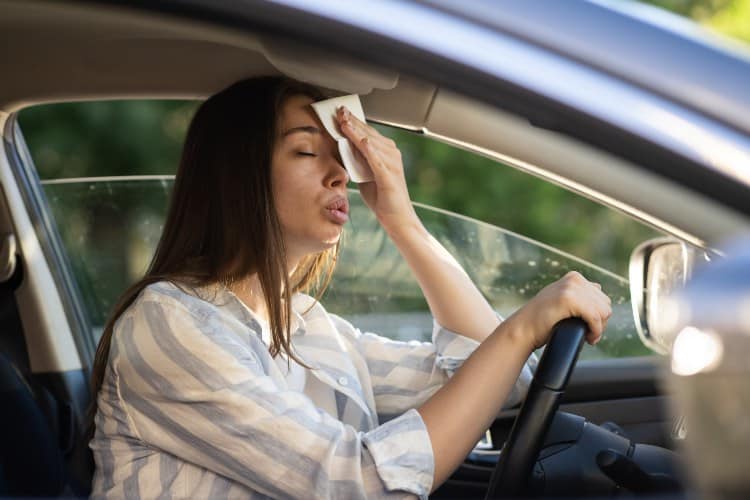Anxiety is your body’s natural way of responding to stress. It is a mental health disorder that affects every aspect of people’s well-being. Some people might find their anxiety highly frustrating during the summer.
Anxiety affects people differently; thus, people respond to it differently. The anxious feeling might also go away or worsen depending on who it affects and how they manage it. Levels of anxiety can change based on the season or environmental factors.
Can Heat Trigger Anxiety?
Many people in the United States associate their happiest memories and experiences with summer. They consider it a time for fun and hanging out with friends and family. However, this is the most challenging time for people with anxiety disorders. The added anxiety can be due to heat since increased temperatures tend to increase anxiety disorder symptoms.
Heat triggers anxiety and causes an increase in cortisol, the stress hormone, which accelerates your anxiety symptoms. In most cases, stress hormones are higher during hot months than in cold ones. They affect the brain’s fear center, causing an increase in anxious thinking and general anxiety symptoms. Some common anxiety symptoms induced by heat include shortness of breath, nausea, fatigue, restlessness, dizziness, sweating, increased heart rate, shaking, and dehydration.
Why Do You Feel More Anxious in The Summer?
Summertime is often a busy time when families and friends gather or go for vacations to enjoy fun outdoor activities. Unfortunately, summer is also when anxiety and its symptoms increase, thus inconveniencing summer activities among persons with anxiety disorders.
Primarily, anxious thoughts in the summer months might worsen due to several factors, such as:
- Change of schedule and routine
People with anxiety disorders maintain a routine to avoid straining the nervous system. Keeping up with this routine in the summer might be difficult due to the many fun activities they are involved in. Disrupting the usual routine is stressful since their brain requires physical, emotional, and mental effort to get used to the new activities. This makes it easy for their anxiety symptoms to worsen.
- Fear of missing out
The fear of missing out and the pressure to have fun are common due to the excitement associated with summer. In addition, social media has worsened anxiety as people are pressured by what their friends are doing for the summer.
The fear of missing the fun worsens the anxiety, especially if one is financially unstable. In addition, the pressure to have fun increases people’s anxiety levels. They may start feeling like failures and beat themselves up about what they are not doing.
- Increased recreational drug use
People often consider summertime the best time to party due to the favorable hot temperatures. However, taking too many recreational drugs might disrupt a person’s sleeping patterns. Thereby causing problems with their nervous system stimulation hence increasing anxiety symptoms.
- Sleep deprivation
Sleep deprivation results from late nights, and prolonged exposure to the sun, which affects the body’s ability to sleep. Short lengths of sleep and sleep deprivation make the body react by increasing cortisol levels. This is because the body tries to compensate for the lack of good sleep. This, in return, increases anxiety levels.
- Seasonal Affective Disorders in Summer (SAD)
SAD symptoms are common during winter due to shorter days and less sunlight. However, people struggling with SAD symptoms in the winter are also likely to have summer anxiety. The summer SAD can be attributed to the long days and short nights. SAD causing summer anxiety occurs because of too much sunlight, which messes up the circadian rhythm, making it difficult to sleep.
Seasonal changes such as summer cause an increase in humidity and high temperature, which increases specific anxiety symptoms.
How to Beat Anxiety during the Hot Weather
It is impossible to change seasonal changes. Fortunately, people with anxiety disorders can apply several strategies to avoid worsening their conditions. Some of the tips people can use to deal with anxiety during summer include:
- Avoid spending too much time in the heat
People with SAD in the summer or during the hot weather should avoid heat and humidity as it triggers anxiety. However, this does not mean they should be trapped indoors; they can make plans based on their comfort. For instance, they can organize family gatherings in the morning when the temperatures are cool. They can also enjoy indoor activities while managing their sensitivity to heat using air conditioners.
- Get adequate sleep
The short summer nights might encourage you to stay awake longer than usual. People with anxiety should get in bed in time to avoid triggering anxiety. If they are still struggling to sleep, they should practice slow breathing, which induces relaxation and allows them to sleep well. People with anxiety should avoid intense workouts and drinking alcohol before bed to sleep better.
- Plan your vacation carefully
When planning summer activities or going on vacation, persons with anxiety disorders must be sure it is what they want. They must also consider their financial situations to avoid stretching and stressing themselves out.
People with AD should include breaks to relax and unwind when planning summer activities. It is hard to get high anxiety symptoms when your mind and body are well relaxed.
- Get the help you need
People should not take signs of anxiety lightly. It is unlikely that symptoms of anxiety will resolve themselves. If one is experiencing anxiety symptoms, one should talk to a therapist for mental health evaluation and get the appropriate treatment.
Need Help? D’Amore Mental Health Is Your Ideal Destination
Most people often isolate themselves when struggling with anxiety to avoid sharing. At D’Amore Mental Health, we are always open and available to help. We urge people to seek help from us when experiencing anxiety at any time of the year.
We have qualified staff who provide individualized professional healthcare services that guarantee you recovery within a short time. We also offer love and support and provide a conducive environment that does not tolerate any form of stigmatization.
Contact us for any inquiries or to access our services.





































